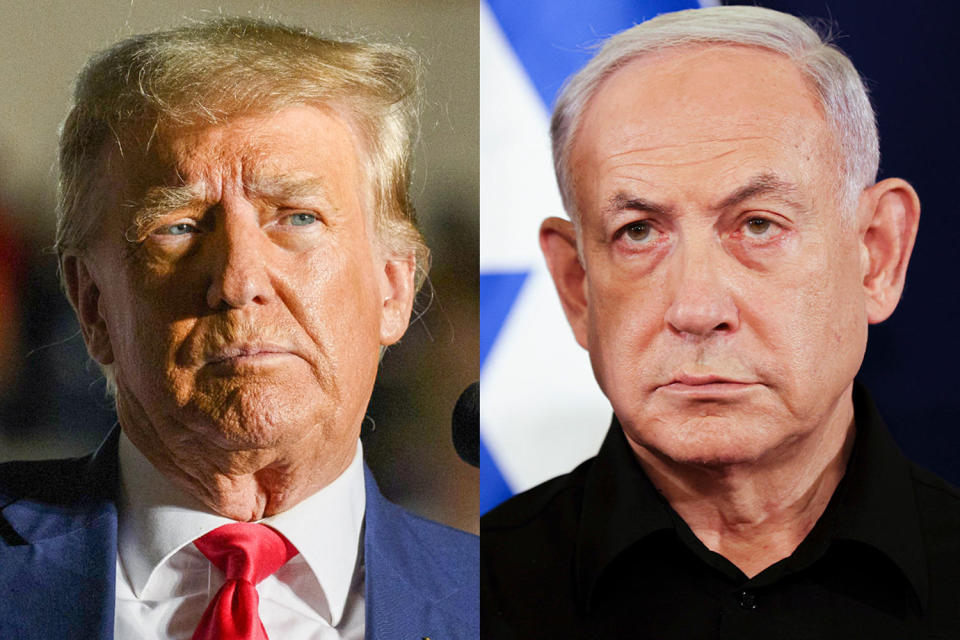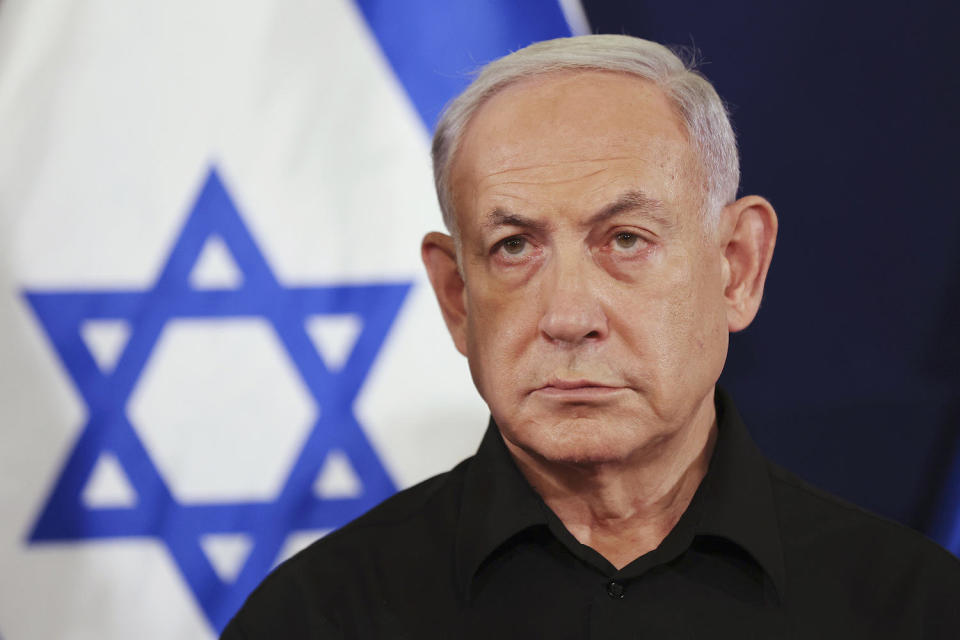Opinion | Netanyahu's dire ICC warnings to Americans sound a lot like Trump
- Oops!Something went wrong.Please try again later.
- Oops!Something went wrong.Please try again later.
- Oops!Something went wrong.Please try again later.
Israeli Prime Minister Benjamin Netanyahu has been making the rounds on American media since the International Criminal Court’s prosecutor-general announced Monday that he’d seek a warrant for Netanyahu’s arrest. In an interview Tuesday night with MSNBC’s “The 11th Hour,” Netanyahu complained of the “false symmetry” that the ICC prosecutor had drawn in pursuing warrants against him and his defense minister with war crimes alongside several members of Hamas leadership.
“That’s like saying, ‘Well, I’m going to issue arrest warrants for’ — after 9/11 — ‘I’m issuing arrest warrants for George [W.] Bush, but also for Osama bin Laden,’” he told MSNBC host Stephanie Ruhle. “And in World War II, ‘I’m issuing arrest warrants for FDR but also for Hitler.’ Thanks a lot. That’s a false symmetry and it’s totally absurd. It’s a travesty of justice.”
Netanyahu, a longtime student of U.S. politics, was clearly carefully crafting his message for his intended audience. In doing so, whether intentionally or not, the longtime Israeli leader was using the same rhetoric that former President Donald Trump has used to decry his legal troubles. Rather than pledge to cooperate and prove their innocence, Bibi and Trump attack the systems designed to hold powerful people accountable.
By centering American presidents in his analogy, Netanyahu shrewdly put on display his understanding of how U.S. policymakers think — that is, almost entirely about themselves. After all, it was American political leaders’ fears that caused the Senate to block ratification of the Rome Statute, the ICC’s founding document. Congress even passed a law in the aftermath of 9/11 and the subsequent invasion of Afghanistan that blocks almost all cooperation with the ICC and bans members of the U.S. military from being extradited to face charges in court in The Hague. And Netanyahu must know that drawing on American pride in winning World War II, and on outrage U.S. officials would have at Hitler comparisons, is rarely a bad bet.
Further, by invoking Bush and Roosevelt, Netanyahu is also attempting to obliquely warn America’s political elite that his fate could be their own if they don’t step in to aid him. It’s a point that Sen. Lindsay Graham, R-S.C., made Tuesday during a Senate Appropriations subcommittee hearing with Secretary of State Antony Blinken. In his opening remarks, Graham warned that “if they’ll do this to Israel, we’re next,” which drew applause from anti-war protestors in attendance. “They tried to come after our soldiers in Afghanistan, but reason prevailed,” he continued, referring to ICC prosecutor-general Karim Khan’s 2001 decision not to focus on potential American war crimes there.
It was an especially striking shift from the senator. Just two years ago, Graham was working on ways to increase U.S. cooperation with the ICC. Of course, that position was voiced in the immediate shadow of Russia’s invasion of Ukraine and was motivated by a desire to see President Vladimir Putin held to account. (Putin was charged at the ICC in 2023 for overseeing the abduction and deportation of children from Ukraine into Russia.) The idea of turning that same system back around on the U.S. and its allies, though, is more than Graham is willing to stomach.
Meanwhile, the idea that a system of justice is necessarily cruel or unfair if it casts its gaze on him has been part and parcel with Trump’s messaging since he first came under investigation. It’s a framing that’s only gotten more explicit — and disturbing — since his first re-election campaign rally last March. “They’re not coming after me,” he told the crowd gathered in Waco, Texas. “They’re coming after you.”
It’s a message he’s repeated often, including at a rally in Georgia soon after special counsel Jack Smith obtained a federal indictment accusing him of trying to steal the 2020 election. More recently, he did so again in an official campaign video posted last month. “They’re not coming after me, they’re coming after you. I just happen to be standing in their way, and I will never, ever be moving out of their way,” he intoned directly into camera.
Whether it’s Trump or Netanyahu saying it, the “it could happen to you” rhetoric is ridiculous fearmongering, as few people listening to them will ever be in a position to face the allegations Trump and Netanyahu are facing. Trump is accused of multiple crimes, including heading a conspiracy to deprive the people of Georgia of their votes and federal charges of obstructing justice in a bid to retain classified documents. Netanyahu, for his part, is accused of using “starvation of civilians as a method of warfare” and “intentionally directing attacks against a civilian population.” None of these alleged crimes is one that just anyone can undertake, nor is the commission of such a crime something any U.S. politician should support.
Trump and Netanyahu are purposefully missing the point that anyone accused of doing the things they’re accused of doing should face accountability for their actions. Netanyahu’s invocation of Roosevelt is smart, but may we never forget that FDR led a United States that firebombed civilians in World War II. The United States is the only country to have deployed a nuclear weapon in a war, and when it did, it did so against a largely civilian population. Decades later, the American military committed well-documented abuses in Iraq and Afghanistan. Attempts to hold accountable those who committed those crimes have been mixed at best, in no small part because Trump pardoned multiple service members and military contractors who were convicted of war crimes.
And even though Graham denounced the ICC’s investigation as undermining the rule of law, Khan’s decision to seek charges against Netanyahu reflects an approach that “remains focused on allegations like the deprivation of humanitarian aid and other collective punishments that are the responsibility of senior leaders,” international law expert David Kaye wrote Monday in The New York Times. “These are the people least likely to face accountability not just in Israeli courts but in any national court worldwide.”
Drawing up arrest warrants for Israeli leaders is not the work of an ICC that is seeking to undermine Israel or bring a prosecution because Israel is Jewish, as Netanyahu has claimed. Likewise, despite Trump’s protestations, prosecutors (not President Joe Biden, whom Trump falsely claims is behind the prosecutions) are attempting to apply the law equally regardless of his former title. Trump and Netanyahu’s attempts to deflect accountability should be seen for the transparent, self-serving ploys that they are. Moreover, we should all be able to recognize that they stand in opposition to an idea we all should embrace: that everyone, even the most powerful men in the world, should be made to stand accountable for their actions.
This article was originally published on MSNBC.com


